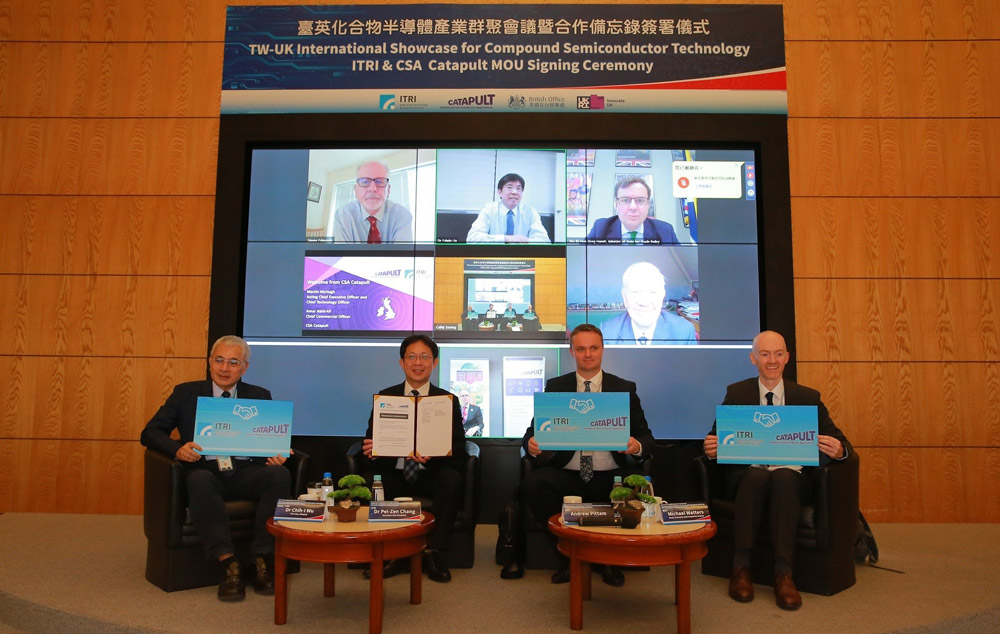News: Suppliers
9 November 2020
ITRI and UK’s CSA Catapult sign MoU
To promote compound semiconductor R&D, Taiwan’s Industrial Technology Research Institute (ITRI) and the UK’s CSA Catapult have signed a memorandum of understanding (MoU), representing a stepping stone for collaboration between two research organizations.
“The UK and Taiwan are natural partners in compound semiconductors,” commented the Right Honorable Greg Hands, UK Minister of State for Trade Policy. “We have complementary strengths which, when combined, will bring the type of innovation leading us toward a more connected and greener world,” he added.
“As one of the world-leading research institutes in semiconductors, ITRI was highlighted in a case study back in 2010 when Hermann Hauser made his recommendations for technology and innovation centers which became the Catapult Network,” notes Dr Simon Edmonds, deputy executive chair & chief business officer of Innovate UK.

Picture: ITRI and CSA Catapult signed an MoU to enhance collaboration on compound semiconductor technology.
Since ITRI has long been working on semiconductor R&D, it has built solid foundation in electronics and optoelectronics, physics, chemistry and material science with frequent interaction and networking with Taiwan’s semiconductor supply chain, remarks ITRI’s president Dr Edwin Liu, and thus it has made the semiconductor industry the most important driving force of Taiwan’s economy. The development of 5G, radio frequency, optical communication and automotive electronics applications in recent years has turned compound semiconductor technology into a new focus in the next generation of semiconductors. “The collaboration is expected to motivate new opportunities by combining CSA Catapult’s technical strengths in semiconductor materials with ITRI's well-built semiconductor process capabilities,” says Liu. As both research organizations aim to connect the R&D sector with industry, he hopes that the alliance will invite more collaborations between semiconductor industries in the UK and Taiwan.
The advances in 5G and AI involve large amounts of data and a need for high-speed computing, making semiconductor material development even more important, notes Dr Chih-I Wu, ITRI vice president & general director of Electronic and Optoelectronic System Research Laboratories. Through the collaboration, ITRI aims to combine CSA Catapult’s proficiency in epitaxy, design and system application with ITRI’s assets in semiconductor research and process development, wide-bandgap power electronics, heterogeneous integration, advanced displays, sensors, and optical communication. “The two parties will focus on next-generation compound semiconductor research and expand the application of compound semiconductors in future 5G and smart Internet products,” he adds.
“This MoU signifies a closer working relationship, advancing semiconductor research between two world-leading organizations,” says Martin McHugh, chief technology officer & acting CEO of CSA Catapult. “Together, we look forward to developing advanced electronic products of the future, while forging long-lasting business relationships.”
Following the long-term plans of national technology development, the Department of Industrial Technology (DoIT) of Taiwan’s Ministry of Economic Affairs has recognized the importance of compound semiconductor developments and has launched the ‘Generation Å Semiconductor Project’. Previously, DoIT has invested in research related to the conversion from light to electricity, power electronics and high-speed radio frequency communications. ITRI says that it has also been striving to transfer compound semiconductor technologies to domestic optoelectronic industries, bridging the gap between lab and market.
With the existing DoIT technology R&D project’s results as a cornerstone, ITRI and CSA Catapult will work together to develop technologies in wide-bandgap power electronics and communications, optoelectronic semiconductors, micro-LEDs, 3D sensing, silicon photonics, heterogeneous integration, and advanced packaging. It is hoped that the partnership can stimulate industry development, establish more connections between Taiwanese and UK industries, and further enhance exchanges and collaboration on both sides to promote high-tech industrial innovation.








